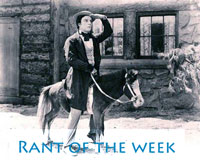
In short: if you saw and admired "127 Hours", please, please get yourself a
copy of "Into the Wild" (2007), and think a lot about the
differences. "Into the Wild" shows you what happened-- like "127
Hours"-- but it has a lot more wisdom to offer.
"127 Hours", like "Slumdog Millionaire", is a film that tries to give you
the feeling that you've been through a bracing, intense, authentic
experience, without having to actually have the authentic experience.
Which is not to say that watching an enlightening film enlightens anybody:
really
awful discussion IMDB.
Why is there no name for this syndrome of young men who admire the courage,
the grace, the beauty of self-immolation? But we know about them.
That's where we get our killers from, whenever we need an army.

2011-01-29
FYI the scene with the two girls at the idyllic pool in the cavern... yes, pure
Hollywood. Didn't happen. But you probably didn't need to be told
that, right?
In a film that is otherwise quite respectful of reality, I guess the producers
couldn't resist. I'm not sure I blame them entirely.
They also couldn't resist going a little over the top at the end...
you're desperate, damnit! You've been trapped for five days! You
think of your dear mother! So you push yourself on and on but your body
gives out and you collapse! You're delirious. Look delirious.
More delirious!...
Or the audience won't get it.

Based on Aron Ralston's book "Between a Rock and
Hard Place". Leaving aside the point that someone who did something
unimaginably stupid (tracking off into the back-country without telling
anyone where he was going) now commands $30K + to give inspirational
speeches, this is a very compelling true story about how Ralston was trapped
in a narrow crevice with a large chock-stone rock pinning his hand against
the side, for 5 days. He had no cell phone or personal locator, only a small
amount of water, and a dull knife. He had not, as I pointed out,
told anybody where he was going. [Note Ralston's
not the only failure to
cash in. Click on the line to read about the commander of the
Greeneville, who crashed into and sank a Japanese fishing vessel while
essentially taking guests on a joy ride.]
As the world knows, Ralston eventually had to cut off his own arm to
escape, and was rescued a few hours later by some Dutch hikers. Not much
actually happens in the film, other than the obvious, but Boyle imbues the story with stylish
flourishes, exploring Aron's memories and feelings as his predicament
becomes progressively grim. It's well-filmed, at the exact location it
happened.
I guess I missed the part where this is an "uplifting" paean to the human
spirit-- he made a stupid mistake and, like any sentient being, wanted very,
very badly to survive, and that's what the movie shows us. How you
morph this into the theme of a speech so that everyone rises and applauds at
the end is a mystery to me. We're supposed to learn that we want to
live. We're supposed to be incredibly pleased that he did something so
stupid he had to pay for it with part of his arm. So when you are out
there thinking that you just want to die, think of Aron Ralston, and be
inspired by his example: you want to live.

For my money, "Into the
Wild", about a not dissimilar situation, has far greater insight into the
issues involved, distilled, at one moment, into the sadness of Hal
Holbrook's face as he realizes that Chris McCandless is about to do
something precisely that stupid. If you missed it-- a
far, far better film than "127 Hours"-- "Into the Wild" is about a young man
named Chris McCandless who was a bit of an adventurer (like Ralston) and a non-conformist (he
gave away his college money to travel, penniless, around the country,
hitch-hiking and camping out), who makes the reckless decision to try to
survive on his own in the wilds of Alaska, hunting and fishing, and living
off the land. The older adults around him can't really try to stop
him, but they know just how crazy and foolish he is, and they still like
him, and try to discourage him.
The difference is that "Into the Wild"
offers some thoughts about the idea of just running off like that, taking
large risks, without the slightest thought for the loved ones you are
possibly leaving behind. "Into the Wild" raises the suggestion that
there is something self-centered and willfully naive about that attitude.
We still admire McCandless, and the adults he met on the road certainly
found him likable-- but that was precisely why his fate was so poignant.
It wasn't necessary. What was the upside to the risk?



